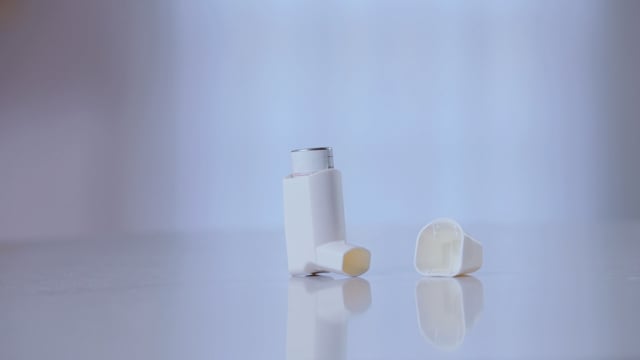- Parents Home
- Para Padres
- A to Z Dictionary
- Allergy Center
- Asthma
- Cancer
- Diabetes
- Diseases & Conditions
- Doctors & Hospitals
- Emotions & Behavior
- First Aid & Safety
- Flu (Influenza)
- Food Allergies
- General Health
- Growth & Development
- Heart Health & Conditions
- Homework Help Center
- Infections
- Newborn Care
- Nutrition & Fitness
- Play & Learn
- Pregnancy Center
- Preventing Premature Birth
- Q&A
- School & Family Life
- Sports Medicine
- Teens Home
- Para Adolescentes
- Asthma
- Be Your Best Self
- Body & Skin Care
- Cancer
- Diabetes
- Diseases & Conditions
- Drugs & Alcohol
- Flu (Influenza)
- Homework Help
- Infections
- Managing Your Weight
- Medical Care 101
- Mental Health
- Nutrition & Fitness
- Q&A
- Safety & First Aid
- School, Jobs, & Friends
- Sexual Health
- Sports Medicine
- Stress & Coping
What's the Difference Between a Nebulizer and an Inhaler?
What Are Inhalers and Nebulizers?
Inhalers and nebulizers are tools that get asthma medicines into the lungs. Most teens with asthma use an inhaler.
Asthma medicines that get breathed in are a key part of asthma treatment. They work to prevent flare-ups from happening and they help keep flare-ups from getting really bad.
How Do Inhalers Work?
Inhalers are handheld devices. They're small enough to carry in a pocket, purse, or backpack. There are a couple of different kinds:
Metered Dose Inhalers (MDIs)
A metered dose inhaler is the type of inhaler doctors usually prescribe for teens. MDIs work a bit like mini-aerosol cans. When the person squeezes the inhaler, it releases a measured puff of medicine.
Some MDIs have counters that show how many doses are left in the inhaler. If you use an MDI that doesn't have a counter, you need to keep track of the number of puffs taken. That's important because inhalers spray even when there's no medicine left. Writing down the number of puffs helps you know when it's time to get a new inhaler.
With an MDI, you need to squeeze the inhaler and breathe the medicine into the lungs right away. If you don't breathe in at exactly the right moment, the medicine may end up in your mouth instead of in your lungs. Using a spacer helps prevent this from happening.
A spacer is a kind of holding chamber for medicine. It attaches to the inhaler on one end and to a mouthpiece or mask on the other end. When you push down on your inhaler, the medicine stays in the spacer until you're ready to breathe it in.
With a spacer, it usually takes a couple of minutes (or less) to get medicine into your lungs.
Dry Powder Inhalers
Like the name says, dry powder inhalers deliver medicine as a powder. The powder is also breathed in, but it doesn't spray out. You need to do more of the work by inhaling the powdered medicine quickly and strongly.
How Do Nebulizers Work?
Nebulizers are machines that turn liquid asthma medicine into a fine mist. The person with asthma breathes the mist into the lungs.
Nebulizers take at least 5 or 10 minutes to deliver the medicine. They can be a bit bulky and noisy, and might not be that easy to carry around.

Using a Nebulizer
Learn step-by-step how to use a nebulizer for asthma.

Using a Dry Powder inhaler
Learn step-by-step how to use a dry powder inhaler for asthma.

Using an Inhaler With a Spacer
Learn step-by-step how to use an inhaler with a spacer for asthma.
What Else Should I Know?
Inhalers can be tricky to use. Your doctor might ask you to take a puff from your inhaler during an office visit to check your technique and be sure the medicine is getting to where it's needed. He or she might recommend using an inhaler to make things easier for you.
If you have questions about your inhaler, ask someone on your asthma care team. They want to be sure that the inhaler you're using is the right one for you. If the medicine isn't getting to your lungs where it's needed, it's not doing any good!

© 1995- The Nemours Foundation. KidsHealth® is a registered trademark of The Nemours Foundation. All rights reserved.
Images sourced by The Nemours Foundation and Getty Images.
Humana Healthy Horizons in Ohio
- Humana Healthy Horizons
- Humana Healthy Horizons Extras
- Member Support
- Care management
- Caregiver resources
- Child well-being
- Disease management
- Documents and forms
- Enrollment
- Grievances and appeals
- Health and wellness
- KidsHealth
- Member Handbook
- New Member Resources
- News and alerts
- OhioRISE Plan
- Pregnancy outcomes
- Tobacco cessation
- Why Humana
- Your primary care provider
- For Providers
- Contact us
- Accessibility
- Humana Healthy Horizons
- Humana Healthy Horizons Extras
- Member Support
- Care management
- Caregiver resources
- Child well-being
- Disease management
- Documents and forms
- Enrollment
- Grievances and appeals
- Health and wellness
- KidsHealth
- Member Handbook
- New Member Resources
- News and alerts
- OhioRISE Plan
- Pregnancy outcomes
- Tobacco cessation
- Why Humana
- Your primary care provider
- For Providers
- Contact us
- Accessibility